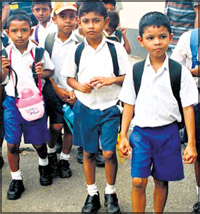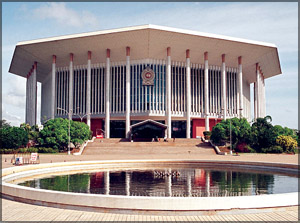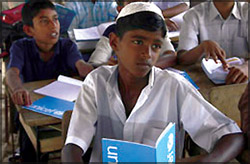
Project to develop and preserve rural tanks
The Environment Affairs Ministry and the Agrarian Services Department
recently launched a project to develop and preserve catchment areas of
rural tanks.
 The programme will pay special attention to preventing soil erosion
in catchment areas through re-forestation and preventing farmers from
encroaching into tank beds. The programme will pay special attention to preventing soil erosion
in catchment areas through re-forestation and preventing farmers from
encroaching into tank beds.
Tank beds are used by farmers to construct houses, cultivation and
animal husbandry.
This has led to the destruction of many small tanks in rural areas.
Programmes to renovate and rehabilitate rural tanks, tank bunds and
canals have been carried out by many government and non-governmental
agencies. This project would encourage farmers to protect tanks
renovated under such programmes.
Tanks such as Ralapanawa, Ihala Galkandegama, Kumbukewewa,
Maradankadawala, Vagayakulama, Nabadawewa and Viharapalugama are already
being developed.
Reforesting catchment areas is also being carried out under the
patronage (support or sponsorship)of the Forest Preservation Department,
with plants such as kumbuk, mee and margoza being used in reforestation.
A sum of Rs. 40,000 is being spent on restoring the catchment area of
a tank. The project will see the participation of farmers on a volunteer
basis.
ICT for A/Levels
 Most children these days are in the forefront when it comes to
computer education; they have a lot of knowledge and awareness about
computers and information technology. Most children these days are in the forefront when it comes to
computer education; they have a lot of knowledge and awareness about
computers and information technology.
In this modern information age, it is very important that one gains a
working knowledge about computers. The world has come to a stage where
being literate means being computer literate.
It is due to this reason that Information and Communication
Technology has been introduced as a subject in schools. Starting from
last year, it is also offered as an alternative subject at the GCE
Ordinary Level Examination.
As a further step in this direction, the Education Ministry has
decided to introduce Information and Communication Technology as a
subject for the Advanced Level, from next year. The first phase of this
programme would see an Education College being established to educate
teachers on this subject.
This may certainly excite those of you who like computers and all
things to do with computers. If everything goes according to plan, you
would also be able to go in for higher studies in the field of
computers.
Grade One admissions:
New policy for 2009
 A committee comprising intellectuals has been appointed to formulate
a new policy for the admission of Grade One students to school for 2009,
according to the Minister of Education, Susil Premajayantha. The
committee report is expected to be submitted to cabinet soon and also be
presented to Parliament. A committee comprising intellectuals has been appointed to formulate
a new policy for the admission of Grade One students to school for 2009,
according to the Minister of Education, Susil Premajayantha. The
committee report is expected to be submitted to cabinet soon and also be
presented to Parliament.
Meanwhile, following guidelines issued by the Supreme Court on
February 1 this year, the Ministry has already taken steps to commence
admissions to Grade One classes in the schools which have not done so to
date, before February 28.
The Minister has pointed out that of the 9,251 schools with Grade One
classes, 9,033 schools comprising national and provincial level schools,
have already started classes. The balance 218 schools, including popular
national and provincial level schools will also commence classes before
the end of this month, according to the Minister.
Under the guidelines given by the Supreme Court, the number of
students in each class will be increased up to 48 students per class
enabling more students to be admitted. This would provide relief to a
number of students who have not been selected due to proximity issues.
There are provisions to also take in more children of the Armed
Forces and also give priority to old girls/boys. Transfers of Public
Servants too will be taken into consideration to provide relief to their
children.
Chinese assistance for museum project
|

BMICH was built with Chinese assistance |
Sri Lanka and China have had a cordial relationship with each other
for a long time, and China has assisted Sri Lanka in numerous ways over
the years. The BMICH, which is one of the most important places in the
country when it comes to holding national events, is one such donation
made by the Chinese.
The cultural ties between the two countries received a further boost
recently, with the Chinese government coming forward to assist the
island build a National Heritage Museum.
This is just one of the many initiatives which would be carried out
with Chinese assistance. These projects, which would be carried out
under the Sri Lanka-China cultural exchange programme, will develop and
preserve the cultural ties between the two countries.
Another major project between Sri Lanka and China is the fully
fledged performing arts theatre which would conform to international
standards. This centre for artists would come up at the former Nomads
Grounds and would include halls, pavilions, dressing rooms and a
1,288-seater theatre.
The centre which would be the stage for many art events such as
recitals, dramas and symphonies would be managed by the Ministry of
Cultural Affairs.
Japanese aid to John de Silva Theatre
A grant of Rs. 3.3 million will be provided by the Japanese
government to the John de Silva Memorial Theatre under its Grant Aid for
Cultural Grassroots Projects scheme.
The funds are to be utilised for the follow-up project of the supply
of lighting equipment carried out at the theatre.
The John de Silva Theatre is managed by the Cultural Affairs
Department and was established in 1974 to promote performing arts.
It provides facilities to artists and producers at concessionary
rates, to encourage the development of traditional art and culture.
Previously, in 1999, the theatre received audio and lighting equipment
worth over 42.7 million yen (Rs. 29.2 million) from Japan under the
Cultural Grant Assistance Scheme.
Japan has been providing Cultural Grant Aid to Sri Lanka since 1979;
a total of 792.1 million yen has been granted up to 2002 towards various
projects, such as the provision of a language laboratory system at the
Kelaniya University, Astronomical Observatory and audio visual equipment
to the Sri Lanka Planetarium, educational programme software to Sri
Lanka Rupavahini Corporation, film preservation equipment to the
Government Film Unit, microfilm equipment to the National Museum
Library, musical instruments to the Aesthetic Training College, audio
and lighting equipment to the John de Silva Memorial Theatre and sound
and lighting equipment to the Tower Hall Theatre.
The construction of a museum at Sigiriya, being carried out at a cost
of Rs. 220 million, is also funded by Japan under this scheme. It is
expected to be completed this year.
An additional grant of 170 million yen (Rs. 172.74 million) has also
been promised towards a project to improve display equipment at the
Sigiriya Museum.
Developing schools in conflict-affected areas
 Arrangements have been made by the Education Ministry to develop 17
under-developed schools which are located in areas affected by the
conflict. Arrangements have been made by the Education Ministry to develop 17
under-developed schools which are located in areas affected by the
conflict.
This project, to be carried out under the third phase of the Jathika
Saviya programme, will seek the assistance of 14 National Schools in its
implementation. The first and second phases of this programme have been
successfully completed.
Invaluable assistance has been provided to the project by most
principals, teachers and students. |
